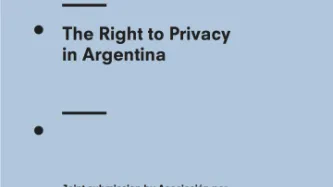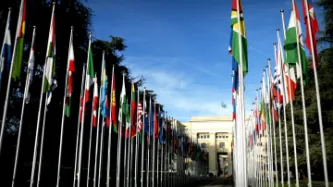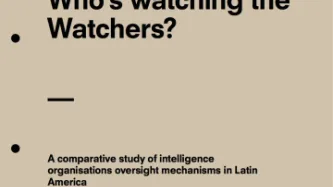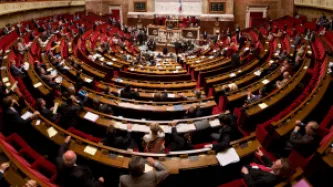Search
Content type: News & Analysis
Este artículo fue co-escrita con Valeria Milanes de la Asociación por los Derechos Civiles (ADC). Una versión en ingles está disponible aquí.
En Enero de 2015, el sistema de inteligencia de Argentina fue objeto de atención pública luego de la muerte del fiscal Alberto Nisman, debido a la presunta participación de los servicios de inteligencia en dicho suceso. Este escándalo impulsó la reforma del sistema de inteligencia del país.
En Febrero del mismo…
Content type: Press release
This week in Geneva, the UN Human Rights Committee will examine the Argentina’s compliance with the International Covenant on Civil and Political Rights (ICCPR), an international treaty which places obligations on signatories to guarantee human rights such as the right to privacy.
This review, by a body of independent experts charged with monitoring compliance with the ICCPR, comes at a critical time for Argentina laws and policies on privacy and surveillance.
Recent years have seen…
Content type: Press release
Esta semana en Ginebra, el Comité de Derechos Humanos de la ONU examinará el cumplimiento de la Argentina con el Pacto Internacional de Derechos Civiles y Políticos (PIDCP), un tratado internacional que establece obligaciones a los firmantes para garantizar los derechos humanos, como el derecho a la privacidad.
Este examen, por un grupo de expertos independientes encargados de vigilar el cumplimiento del PIDCP, llega en un momento crítico para las leyes y políticas de la Argentina sobre la…
Content type: Advocacy
La Asociación por los Derechos Civiles (ADC) y Privacy International toman nota de las respuestas del gobierno de Argentina a la lista de cuestiones antes de la presentación del informe, en particular en relación a la legislación, políticas y prácticas relacionadas con la vigilancia y la protección de los datos personales.
Privacy International es una organización de derechos humanos que trabaja para favorecer y promover el derecho a la privacidad y la lucha contra la vigilancia en todo el…
Content type: Advocacy
Asociación por los Derechos Civiles (ADC) and Privacy International note the replies by the government of Argentina to the list of issues prior to the submission of the report, in particular in relation to the laws, policies and practices related to surveillance and protection of personal data.
Privacy International is a human rights organisation that works to advance and promote the right to privacy and fight surveillance around the world. The Asociación por los Derechos Civiles (ADC) is a…
Content type: Advocacy
La Asociación por los Derechos Civiles (ADC) y Privacy International toman nota de las respuestas del gobierno de Argentina a la lista de cuestiones antes de la presentación del informe, en particular en relación a la legislación, políticas y prácticas relacionadas con la vigilancia y la protección de los datos personales.
Privacy International es una organización de derechos humanos que trabaja para favorecer y promover el derecho a la privacidad y la lucha contra la vigilancia en todo el…
Content type: News & Analysis
In 2015 the United Nations' human rights mechanisms significantly increased their capacity to monitor and assess states' compliance with their obligations around the right to privacy. Notably, the Human Rights Council established the mandate of the Special Rapporteur on the right to privacy, filling a significant gap in the international human rights protection system. Meanwhile, the Human Rights Committee put surveillance laws and practices in a range of countries under close scrutiny, making…
Content type: News & Analysis
Today Privacy International together with other international human rights organisations call on the French parliament [PDF] to reject a bill on international surveillance, which, as it is currently worded, fails to protect and respect the right to privacy of individuals worldwide.
In June this year, the French parliament passed a law regulating the work of the intelligence services that will greatly undermine the privacy of French residents. Soon after, the French…
Content type: Advocacy
This stakeholder report is a submission by Privacy International (PI). PI is a human rights organisation that works to advance and promote the right to privacy and fight surveillance around the world. PI wishes to bring concerns about the protection and promotion of the right to privacy in France before the Human Rights Committee for consideration in France’s upcoming review.
Content type: Press release
Privacy International, Amnesty International, FIDH, the French League for Human Rights and Reporters Without Borders are alarmed by the expansive surveillance powers to be granted to surveillance agencies contained in a Bill transferred to the French parliament on Friday. Under the new law, French intelligence agencies would be empowered to hack into computers and devices and spy on the communications of anyone who makes contact with a person under suspicion, even incidentally. The new law will…
Content type: News & Analysis
The French Government unveiled a new Bill that aims at providing a legal framework to intelligence services last Friday. While Privacy International welcomes the positive step of placing powers that were until now poorly regulated under the law, we remain alarmed by many aspects of this Bill. Two months after the deadly terrorist attacks in Paris that targeted the satirical weekly Charlie Hebdo and a Kosher supermarket, the Government seeks to provide the intelligence services with a…
Content type: News & Analysis
UPDATE: Argentina's President Cristina Fernandez de Kirchner has announced plans to disband Argentina's intelligence agency. Go here for more, and keep reading below.
This post was originally published on 20 January 2015 by Privacy International's partner in Argentina, the Asociación por los Derechos Civiles (ADC). To read the original post, please go here.
In view of the serious incidents that took place on 18 January 2015, the Asociación por los Derechos Civiles (ADC)…
Content type: Report
In societies that are in the process of transition towards democracy, democratic control of intelligence organisations is both an indispensable requirement and a pressing need. In many cases, the most serious human rights violations committed by dictatorial governments were intrinsically linked to draconian surveillance and control systems. Systematic spying on trade unions, students and dissident groups was a common feature of 20th-century dictatorships. The persistent violation of citizens’…
Content type: News & Analysis
In the same week that the Advocate General of the European Court of Justice labelled the retention of electronic communications data throughout Europe as a “serious interference with the right to privacy”, the French National Assembly has codified into law a suite of invasive and unrestrained surveillance powers, allowing an expanded range of government bodies invasive access to citizens electronic communications data and content and threatening the privacy rights of the French people.…
Content type: News & Analysis
Just a few weeks ago, thousands of Argentinians had their privacy rights violated when the country’s electoral registration roll, which had been made available online, experienced a major leak of personal data following the presidential election.
Despite some early warnings on the weaknesses of the system, the government did nothing to fix the situation, allowing serious technical flaws in an online system to persist and refusing to respond to the crisis, further…
Content type: News & Analysis
The social news website MiroirSocial.com confirmed yesterday that the prominent French technology firm Bull SA has sold its controversial mass surveillance "Eagle" system to Stéphane Salies, one of its chief designers and an ex-director of Bull. The surveillance software was previously manufactured and supplied by Bull’s subsidiary, Amesys, a company that is currently the subject of a judicial enquiry in Paris following a legal complaint filed by two human rights organisations, the…
Content type: Press release
In his response to the third report from the Foreign Affairs Committee Session 2012-13, Foreign Secretary William Hague expressed for the first time the government's firm commitment to putting in place new export controls on "telecommunications equipment for which there is a reasonable expectation that it might be used to restrict freedom of expression on the internet". He added that the government was committed to "working with international partners through the mechanism of the Wassenaar…
Content type: Press release
Privacy International (PI) today filed additional complaints with authorities in Japan, Israel, Korea, Taiwan, Province of China, Thailand and Argentina. On June 27th PI filed simultaneous complaints with Data Protection and Privacy regulators in 32 countries concerning recent revelations of secret disclosures of records from SWIFT to US intelligence agencies.(1)
The disclosures involve the mass transfer of data from SWIFT in Europe to the United States, and possibly direct access by US…
Content type: News & Analysis
The French government is considering the implementation of a new project, Project INES (Identite National Electronique Securisee), which will involve a system very similar to the one proposed in the UK. The French are even using similar statements, such as 'international obligations', 'terrorism', and concern regarding 'identity theft'. The Forum for Civil Liberties on the Internet ("Le Forum des droits sur l'internet) was asked by then Minister of the Interior Dominique de Villepin to conduct…
Content type: News & Analysis
The French Socialist Party suffered a resounding defeat in parlimentary elections on March 21st and 28th, in part due to a wiretapping scandal that broke a week before the elections. Results showed that they lost over 200 seats in the Parliment and became the minority party. Socialist President Francois Mitterrand will remain in office but is expected to face a tough election in 1994.
The scandal emerged after reports and transcripts were leaked to Paris Daily Liberation, showing that a…














